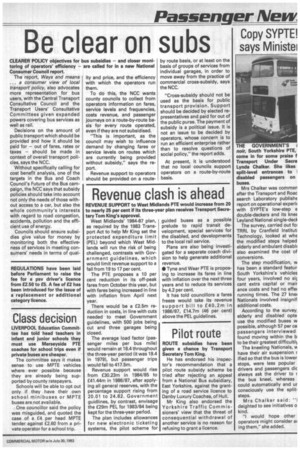Be clear on subs
Page 17

If you've noticed an error in this article please click here to report it so we can fix it.
CLEARER POLICY objectives for toring of operators' efficiency — Consumer Council report.
The report, Ways and means ... a consumer view of local transport policy, also advocates more representation for bus users, with the Central Transport Consultative Council and the Transport Users' Consultative Committees given expanded powers covering bus services as well as rail.
Decisions on the amount of public transport which should be provided and how it should be paid for — out of fares, rates or taxes — should be made in context of overall transport policies, says the NCC.
Without specifically calling for cost benefit analysis, one of the targets in the Bus and Coach Council's Future of the Bus campaign, the NCC says that subsidy policies should take into account not only the needs of those without access to a car, but also the whole community's interests with regard to road congestion, accidents, pollution and the efficient use of energy.
Councils should ensure subsidies give value for money by monitoring both the effectiveness of services in meeting consumers' needs in terms of qual ity and price, and the efficiency with which the operators run them.
To do this, the NCC wants county councils to collect from operators information on fares, service levels and frequencies, costs revenue, and passenger journeys on a route-by-route basis for every route operated, even if they are not subsidised.
"This is important, as the council may wish to influence demand by changing fares or service levels on routes which are currently being provided without subsidy," says the report.
Revenue support to operators should be provided on a route
by route basis, or at least on the basis of groups of services from individual garages, in order to move away from the practice of commercial cross-subsidy, says the NCC.
"Cross-subsidy should not be used as the basis for public transport provision. Support should be decided by elected representatives and paid for out of the public purse. The payment of subsidy is a political issue. It is not an issue to be decided by operators, whose concern is to run an efficient enterprise rather than to resolve questions of social policy," the report adds.
At present, it is understood that no local councils support operators on a route-by-route basis.




















































































